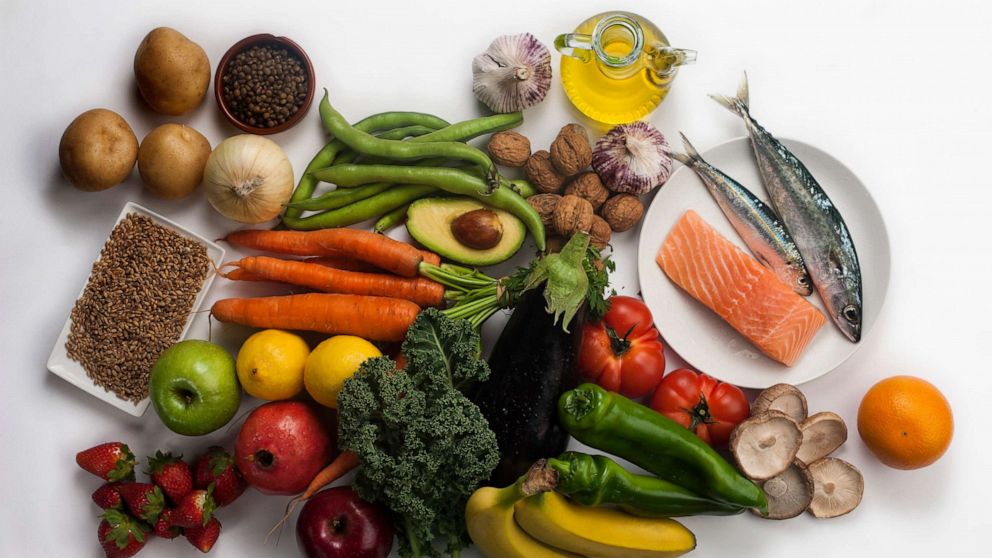
 i_need_contribute
i_need_contribute
The flexitarian, Mediterranean and TLC diets all tied for first place in the family-friendly category of U.S. News and World Report's annual ranking of diets.
The flexitarian diet is one that encourages a vegetarian diet most of the time, but has flexibility to also include animal proteins like a hamburger. The Mediterranean diet centers on whole grains, healthy fats, vegetables, fruits and seafood, while the TLC diet, which stands for therapeutic lifestyle changes, also calls for eating lots of vegetables, whole grains, fruits and lean meats, according to Gretel Schueller, managing editor of U.S. News and World Report.
Schueller said the magazine considers diet in its rankings to be a way of eating, not a plan to lose weight. She said the rankings’ new family-friendly category is an acknowledgement that families want to eat healthy together and not follow multiple meal plans.
"Obviously, you don't want to prepare multiple meals for different family members every day, because that's not going to last very long," Schueller told ABC News. "We wanted to make sure that the eating plan offered nutritional value for different calorie and nutritional needs, for example, different ages, different activity levels, health conditions, when you have a different group of people."
She added, "You can eat literally anything on those diets. It's about making sure that the bulk of your your calories and your nutrition is coming from vegetables and fruits and whole grains."
Nutrition experts say there's no one diet that will work for everyone. Certain diets may be more beneficial depending on your circumstances. Anyone considering changes to their diet should consult with their doctor, experts say.
U.S. News' panel of experts that determine the annual diet rankings also looked at "real-world constraints" like budget, meal prep time and availability of foods when picking the best family-friendly diets, according to Schueller.
"For example, how easy is it to find that required supplement or food ingredient," she said. "We also asked how adaptable is that diet for whole family or group of people with different cultural, religious or dietary preferences."
In addition to ranking at the top of the family-friendly category, the Mediterranean, flexitarian and TLC diets each also ranked in the top five of the Best Overall Diets category in U.S. News and World Report's rankings.
The Mediterranean diet topped the list as the best diet for the sixth year in a row.
"Any plan that cuts out an entire food group or fruit or dairy for non-medical reasons is a red flag and it's the reason the Mediterranean diet is always such a big winner," said Schueller. "You're eating delicious whole foods. It's backed by decades of research showing its health benefits for a variety of health conditions. The Mediterranean diet is healthy, it's sustainable, it's a flavorful way to eat and it's adaptable."
She continued, "It's not just about olives and feta and other foods of the Mediterranean. You can adapt the principles of this Mediterranean lifestyle for virtually any cuisine, any culture."
MORE: Eating a more plant-based diet can add years to your life, study finds
Close watchers will notice that this year's Best Diets list does not include some culturally popular diets like Whole30 as it has in the past.
U.S. News' panel of experts -- which includes top specialists in nutrition, diabetes, heart health and weight loss -- decided this year to focus on "quality over quantity" and ranked a total of 24 diets.
Weight Watchers, now known as WW, scored the top spot in two categories, Best Weight-Loss Diets and Best Diet Programs.
The keto diet, which focuses on eating foods high in fat and low in carbohydrates, ranked No. 1 in the category of Best Fast Weight-Loss Diets, while it ranked 20th in the Best Overall Diets list.
MORE: Your questions answered on popular diet shown to reduce risk of depression
"What we're seeing is that diets that support people learning to make healthy eating choices and smart meal-prepping on their own are the diets that do well, while diets that are overly restrictive, whether we're talking about calories or whole food groups, those are the diets that rank poorly," said Schueller. "There's not a one-size-fits-all approach to diets. You've got to consider your personality and lifestyle."
Here is a breakdown of the top five diets in U.S. News and World Report's 2023 Best Diets Overall ranking.
U.S. News and World Report calls the Mediterranean diet a "well-balanced eating plan" and points to research that suggests the diet helps prevent some chronic diseases and increases longevity.
The Mediterranean diet emphasizes eating fruits, veggies, whole grains, beans, nuts, legumes, virgin olive oil and flavorful herbs and spices; fish and seafood at least twice a week; and poultry, eggs, cheese and yogurt in moderation, according to U.S. News and World Report.

STOCK PHOTO/Getty Images
Vegetables, fruits, beans, nuts, whole grains, fish and olive oil make up the majority of a Mediterranean diet.
It focuses on the quality of foods rather than a single nutrient or food group. People who follow a Mediterranean diet enjoy red meat and desserts as "occasional treats," the magazine says. Red wine in moderation and with meals is optional.
"This type of low-fat eating pattern leaves little room for the saturated fat, added sugars and sodium that inundate the standard American diet," the magazine says. "People who eat a Mediterranean-style diet have longer lifespans, report a higher quality of life and are less likely to suffer from chronic diseases such as cancer and heart disease."
The DASH diet, made up of low-sodium and healthful foods, was originally started by the National Heart, Lung, and Blood Institute (NHLBI) as a diet to help reduce blood pressure.
The NHLBI publishes free guides on the plan so you can see if it is right for you.

Marilyna/Getty Images/iStockphoto
Healthy food selection with fresh vegetables, fruit, herbs, pulses, seeds and nuts.
The plan focuses on fruit, vegetables, whole grain, lean protein and eliminates foods high in fat, like fatty meats and full-fat dairy, and sugar-sweetened drinks and sweets, according to U.S. News and World Report. An important component is minimizing the intake of salt, which is shown to lower blood pressure.
"The DASH diet is similar to the Mediterranean dietary pattern but gives more concrete recommendations and advice on actual amounts and limits of types of foods consumed," the magazine says, noting that food groups are not eliminated in the DASH diet, which provides serving recommendations.
The flexitarian diet encourages people to try alternative meat options, like tofu, but leaves room for flexibility if you can't quite fully give up meat. The diet was promoted by dietitian Dawn Jackson Blatner in a 2009 book that says you can reap the benefits of a plant-heavy diet even if you eat meat occasionally, according to U.S. News and World Report.
This plant-heavy diet focuses on adding five food groups -- "new meat," fruits and vegetables, whole grains, dairy and sugar and spices -- to your diet instead of taking foods away.
The "new meat" food group includes tofu, beans, lentils, peas, nuts, seeds and eggs, according to U.S. News and World Report, which notes the health benefits of the diet can include a lower rate of heart disease, diabetes and cancer.

Aamulya/Getty Images/iStockphoto
Assortment of healthy food ingredients for cooking on a kitchen table.
"With a flexitarian diet – often called a semi-vegetarian diet – you don't have to eliminate meat completely to reap the health benefits associated with vegetarianism," the magazines states. "Instead, you can be a vegetarian most of the time, but still enjoy a burger or steak when the urge hits."
The Mediterranean-DASH Intervention for Neurodegenerative Delay (MIND) diet is a hybrid of the top-rated DASH and Mediterranean diets.
Research has shown that this diet may improve cognitive function in older adults and may be superior to other diets in this regard, including those listed here.
The diet focuses on food groups known to improve brain health, including green leafy vegetables in particular, all other vegetables, nuts, berries, beans, whole grains, fish, poultry, olive oil and wine," according to U.S. News and World Report.
Among the diet's requirements is eating three servings of whole grains, a salad and another vegetable daily, as well fish once a week and poultry twice a week. Foods like red meat, sweets and full-fat cheese are limited.
The TLC (Therapeutic Lifestyle Changes) diet was created by the National Institute of Health’s National Cholesterol Education Program with the "goal of cutting cholesterol as part of a heart-healthy eating regimen," according to U.S. News and World Report.
In addition to setting a daily caloric goal, participants aim to cut saturated fat to less than 7% of daily calories and aim to consume no more than 200 milligrams of dietary cholesterol per day, according to U.S. News and World Report.
The diet calls for eating lots of vegetables, fruits, low-fat or fat-free dairy and lean meats, and allows for servings of breads and pasta too. Fatty fish such as salmon and tuna are recommended to be eaten twice a week, while consuming egg yolks is restricted to two times or less per week. A high intake of soluble fiber of 10 to 25 grams per day is also recommended.
The emphasis of this diet on keeping detailed track of cholesterol intake can make it hard for people to follow. Moreover, more recent research suggests that dietary cholesterol does not seem to have an impact on cardiovascular disease risk, so specific intake restrictions are no longer recommended.
A scientific advisory statement from the American Heart Association recommended that dietary guidance should instead focus on healthy dietary patterns, like the Mediterranean and DASH diets, that are inherently low in cholesterol.